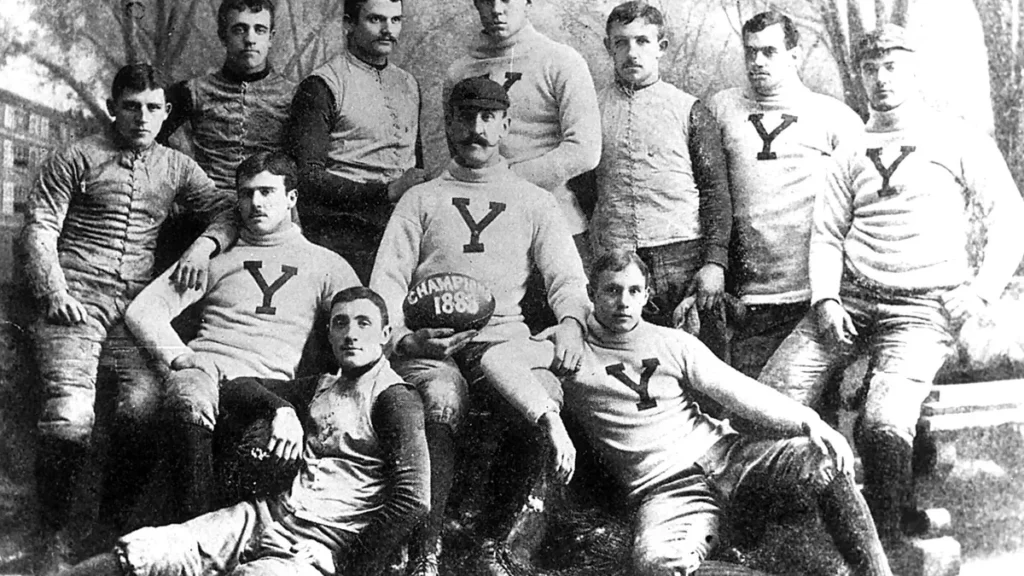When we think of American football today—with its fast-paced plays, strategic formations, and passionate fan base—it’s hard to imagine the sport without its current rules and structure. But much of what defines the modern game can be traced back to one man: Walter Camp. Known as the “Father of American Football”, Camp’s contributions shaped the sport from a chaotic mix of rugby and soccer into the organized game we know today.
In this article, we’ll dive into Walter Camp’s most important contributions to football, how he revolutionized the game, and why his legacy still matters.
📖 Who Was Walter Camp?
Walter Camp was born on April 7, 1859, in New Haven, Connecticut. A Yale University graduate and athletic standout, Camp was not just a talented player—he was a visionary. He played football at Yale from 1876 to 1882 and later coached the team, leaving behind a remarkable 67–2 coaching record.
But beyond the field, Camp was a rule-maker, strategist, and innovator who helped transform American football from a rudimentary game into a structured, tactical sport.
🏈 Top Contributions of Walter Camp to American Football
1. The Line of Scrimmage
Before Camp, teams restarted play similar to rugby scrums. Walter Camp introduced the line of scrimmage, a set position from which each play begins. This rule created a foundation for planning and executing offensive strategies.
2. The Down and Distance System
Camp implemented the downs system, where a team must advance the ball a certain distance (originally 5 yards in 3 attempts) to retain possession. Today’s version is 4 downs to gain 10 yards, and it remains a central aspect of American football strategy.
3. Reducing Team Size to 11 Players
Earlier football versions often featured teams of 15 to 20 players. Camp proposed reducing team sizes to 11 per side, encouraging more tactical and strategic gameplay. This move balanced offense and defense, making the sport more dynamic and spectator-friendly.
4. The Snap from Center
Camp replaced rugby’s chaotic scrum with a methodical snap, where the ball is passed backward from the center to the quarterback. This single rule helped define player roles and organize the game into plays.
5. Standardization of Scoring
Walter Camp also played a key role in shaping the scoring system. He defined point values for touchdowns, field goals, and safeties, establishing a more balanced and fair method of scoring that has evolved but still retains Camp’s framework.
6. Development of the Quarterback Role
Thanks to the snap and structured play, Camp helped create the role of the quarterback—a central figure responsible for leading the offense. This made the game more strategic and exciting.
7. Rule Committees and Influence
Camp served on various rules committees for decades and published numerous guidebooks, setting the standards followed by schools and professional teams. His yearly publications were the go-to resource for understanding football’s evolving rules.
📘 Walter Camp’s Legacy in Football
Walter Camp’s influence is so monumental that he is remembered not only as a rule-maker but as a founding father of American sports culture. His name lives on through:
- The Walter Camp Foundation
- Walter Camp All-America Teams (recognizing college football’s best players)
- Induction into the College Football Hall of Fame
📊 Quick Recap: Walter Camp’s Key Contributions
| Contribution | Impact |
| Line of Scrimmage | Structured gameplay |
| Down-and-Distance System | Strategy and pacing |
| 11-Player Teams | Balanced team structure |
| The Snap | Organized offensive plays |
| Scoring Standardization | Fair and exciting point system |
| Creation of Quarterback | Central leadership role in offense |
| Rule Writing & Committees | Consistency and nationwide influence |
🧠 Why Walter Camp’s Innovations Still Matter
Without Walter Camp, American football might never have become the organized, professional, and globally recognized sport it is today. His vision not only shaped collegiate football but also laid the groundwork for the NFL, which continues to thrive as one of the most watched leagues in the world.
FAQ’s
1. Why is Walter Camp called the “Father of American Football”?
Walter Camp created many important football rules, like the line of scrimmage and downs system. That’s why people call him the “Father of American Football.”
2. What was the first big change Walter Camp made in football?
He added the line of scrimmage. This helped teams start plays in an organized way instead of a messy scrum like in rugby.
3. What is the downs system, and why is it important?
The downs system means a team must move the ball forward a certain distance in a few tries. It helps keep the game fair and exciting.
4. Why did Walter Camp reduce team size to 11 players?
With fewer players, the game became easier to control and more fun to watch. It also made the game safer and more strategic.
5. Did Walter Camp help create the quarterback position?
Yes! When he introduced the snap, it led to the creation of the quarterback, the leader of the team’s offense.
6. What changes did Camp make to the scoring system?
He gave point values to touchdowns, field goals, and safeties. This made it clear how teams could win the game.
7. Were Camp’s rules only for college football?
No, his rules were used in college games and also helped shape professional football, including the NFL.
8. What is the Walter Camp Foundation?
It’s an organization that honors the best college football players each year through the Walter Camp All-America Team.
Final Thoughts
Walter Camp wasn’t just a football player—he was an architect of a sport that now captivates millions. His innovations transformed football from a rugged pastime into a cultural icon. Whether you’re watching a college game on Saturday or an NFL clash on Sunday, you’re witnessing the legacy of Walter Camp’s contributions in every snap, touchdown, and strategic play.

